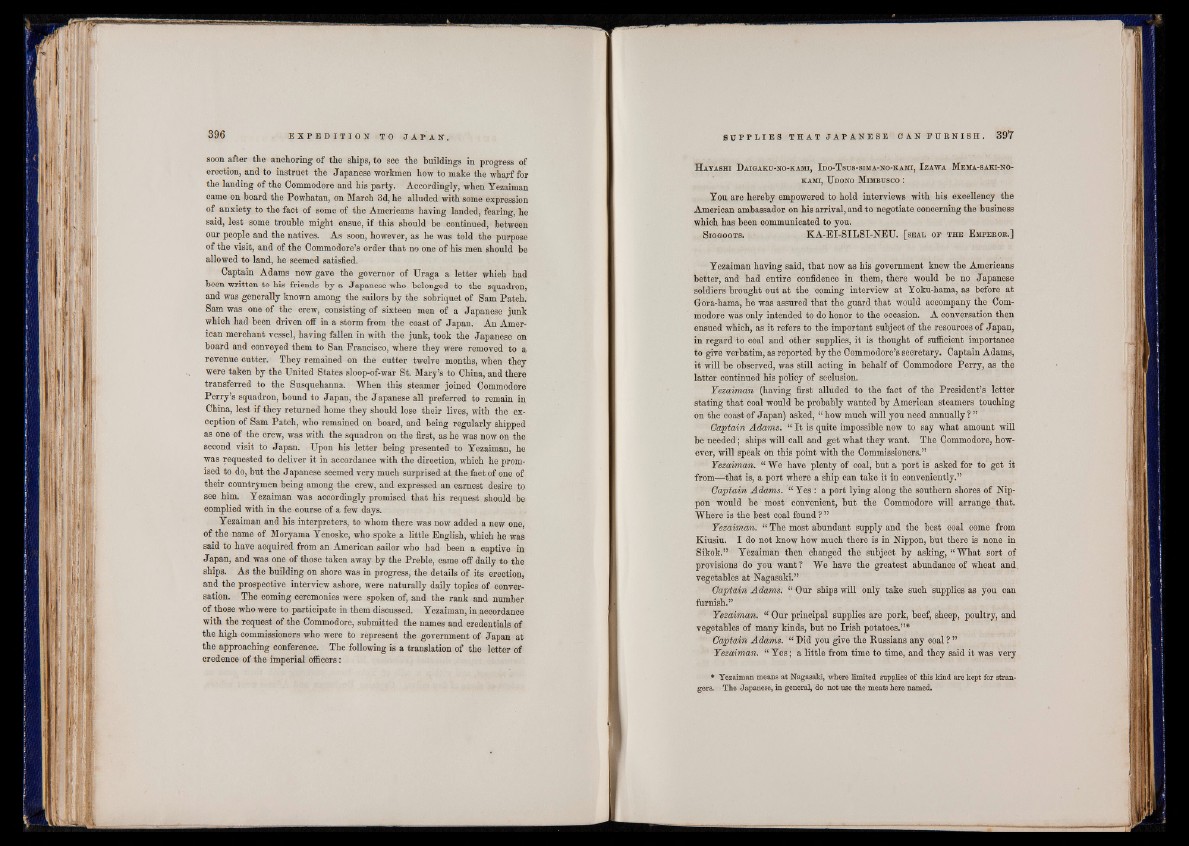
soon after the anchoring of the ships, to see the buildings in progress of
erection, and to instruct the Japanese workmen how to make the wharf for
the landing of the Commodore and his party. Accordingly, when Yezaiman
came on board the Powhatan, on March 3d, he alluded with some expression
of anxiety to the fact of some of the Americans having landed, fearing, he
said, lest some trouble might ensue, if this should be continued, between
our people and the natives. As soon, however, as he was told the purpose
of the visit, and of the Commodore’s order that no one of his men Bhould be
allowed to land, he seemed satisfied.
Captain Adams now gave the governor of Uraga a letter which had
been written to his friends by a Japanese who belonged to the squadron,
and was generally known among the sailors by the sobriquet of Sam Patch.
Sam was one of the crew, consisting of sixteen men of a Japanese junk
which had been driven off in a storm from the coast of Japan. An American
merchant vessel, having fallen in with the junk, took the Japanese on
board and conveyed them to San Francisco, where they were removed to a
revenue cutter. They remained on the cutter twelve months, when they
were taken by the United States sloop-of-war St. Mary’s to China, and there
transferred to the Susquehanna. When this steamer joined Commodore
Perry’s squadron, bound to Japan, the Japanese all preferred to remain in
China, lest if they returned home they should lose their lives, with the exception
of Sam Patch, who remained on board, and being regularly shipped
as one of the crew, was with the squadron on the first, as he was now on the
second visit to Japan. Upon his letter being presented to Yezaiman, he
was requested to deliver it in accordance with the direction, which he promised
to do, but the Japanese seemed very much surprised at the feet of one of
their countrymen being among the crew, and expressed an earnest desire to
see him. Yezaiman was accordingly promised that his request should be
complied with in the course of a few days.
Yezaiman and his interpreters, to whom there was now added a new one,
of the name of Moryama Yenogke, who spoke a little English, which he was
said to have acquired from an American sailor who had been a captive in
Japan, and was one of those taken away by the Preble, came off daily to the
ships. As the building on shore was in progress, the details of its erection,
and the prospective interview ashore, were naturally daily topics of conversation.
The coming ceremonies were spoken of, and the rank and number
of those who were to participate in them discussed. Yezaiman, in accordance
with the request of the Commodore, submitted the names and credentials of
the high commissioners who were to represent the government of Japan at
the approaching conference. The following is a translation of the letter of
credence of the imperial officers:
H ayashi Daigaku-no-kami, I do-Tscs-sima-no-kami, I zawa Mema-saki-no-
kami, Udono Mimbosco :
You are hereby empowered to hold interviews with his excellency the
American ambassador on his arrival, and to negotiate concerning the business
which has been communicated to you.
Sioooots. KA-EI-SILSI-NEU. [seal of the E mperor.]
Yezaiman having said, that now as his government knew the Americans
better, and had entire confidence in them, there would be no Japanese
soldiers brought out at the coming interview at Yoku-hama, as before at
Glora-hama, he was assured that the guard that would accompany the Commodore
was only intended to do honor to the occasion. A conversation then
ensued which, as it refers to the important subject of the resources of Japan,
in regard to coal and other supplies, it is thought of sufficient importance
to give verbatim, as reported by the Commodore’s secretary. Captain Adams,
it will be observed, was still acting in behalf of Commodore Perry, as the
latter continued his policy of seclusion.
Yezaiman (having first alluded to the feet of the President’s letter
stating that coal would be probably wanted by American steamers touching
on the coast of Japan) asked, “ how much will you need annually ? ”
Captain Adams. “ I t is quite impossible now to say what amount will
be needed; ships will call and get what they want. The Commodore, however,
will speak on this point with the Commissioners.”
Yezaiman. “We have plenty of coal, but a port is asked for to get it
from—that is, a port where a ship can take it in conveniently.”
Captain Adams. “ Yes : a port lying along the southern shores of Nippon
would be most convenient, but the Commodore will arrange that.
Where is the best coal found ? ”
Yezaiman. “ The most abundant supply and the best coal come from
Kiusiu. I do not know how much there is in Nippon, but there is none in
Sikok.” Yezaiman then changed the subject by asking, “What sort of
provisions do you want? We have the greatest abundance of wheat and.
vegetables at Nagasaki.”
Captain Adams. “ Our ships will only take such supplies as you can
furnish.”
Yezaiman. “ Our principal supplies are pork, beef, sheep, poultry, and
vegetables of many kinds, but no Irish potatoes.”*
Captain Ada/ms. “ Did you give the Russians any coal ? ”
Yezaiman. “ Yes; a little from time to time, and they said it was very
* Yezaiman means at Nagasaki, where limited supplies of this kind are kept for strangers.
The Japanese, in general, do not use the meats here named.